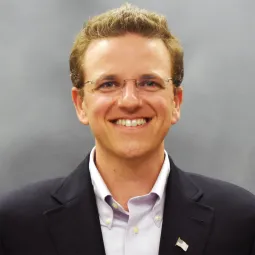One day when Andrew Hall was 10 or 11, wandering among the shelves of a bookstore in Orange, Connecticut, he found himself drawn to a particularly thick tome. Picking it up, he found that it contained part of the classic history of early Rome written by Livy, a Roman historian who lived from roughly 59 B.C. to A.D. 17. Hall brought the book home — and, thus, a decades-long passion was born.
“I was obsessed with that book,” Hall says. “I just thought it was the most interesting thing that thousands of years ago, people were already thinking really, really hard about democracy and how to set it up.”
Hall, now a professor of political economy at Stanford GSB, didn’t yet know about political science, and wouldn’t for many years, but the question of how to best design a government stuck with him. It hasn’t gone anywhere since.
Hall has become known for tackling some of the thorniest and timeliest questions facing Americans about their systems of government, such as: What is driving polarization in our country’s politics, and what can be done to address it? Do political parties benefit when they run more extreme primary candidates? Do voting administration changes, like allowing voters to cast ballots by mail, come with an inherent partisan advantage?
“He has this knack for finding questions that are interesting both to the public and to political scientists — and answering them in a way that convinces the most skeptical of readers,” says Daniel Thompson, assistant professor of political science at UCLA and a former PhD advisee of Hall’s at Stanford. Thompson adds that Hall manages this, in part, by leveraging data and research designs that are carefully tailored to his research questions. “Pulling that off is impressive, and it’s also important. It convinces a lot of people who care about the details — and who otherwise would not be convinced to think differently.”
Hall is now bringing the fruits of his findings into internet spaces, where he is eager to support burgeoning efforts to build decentralized, democratic systems of governance. He has worked as an advisor to tech companies, including Meta, that are wrestling with questions both philosophical and practical about how to build more functional, more democratic communities across their platforms.
“This is very related to my research, because the questions really are, how do you design constitutions for the online world? How do you design democracies for these huge online platforms of the future?” Hall says. “That connects all the way back to what Livy and others were arguing about for the physical world.”
Questions of Governance, Tools of Economics
Hall studied Classics as an undergrad at Stanford. Fearing for his future job prospects, he added some economics classes to his roster, too. As graduation approached, he felt aimless and unsure of his next move. Looking back, he sees a stroke of clarity in scuttling plans for a consulting internship the summer after his junior year in favor of working as a research assistant for Stanford professor of political science, history, and economics Stephen Haber. It was in his work with Haber that Hall discovered the field of political economy, a realm he now describes as “halfway between political science and economics.”
“It was only then that I realized, oh, I could take these questions we’ve been studying for thousands of years about how to design a government and make it work well, and use the tools I’d learned in my economics classes to try to answer them,” Hall says. He went on to earn his PhD in political science, and right away began carving out his own space in the field of political economy.
He graduated with his PhD from Harvard in 2015, and the same year, published his first research on political extremism — which was suddenly and conspicuously on the rise in the U.S. One paper in particular, “What Happens When Extremists Win Primaries?” attracted widespread attention. In it, he analyzed data from primary elections for the U.S. House of Representatives between 1980 and 2010, and found that when an extremist candidate (from either party) beat a more moderate opponent in the primary, the extremist’s party saw their likelihood of winning the general election decrease by between 35 and 54 percentage points. In other words, he concludes, voters (at least in general elections) actually tend to exert a moderating influence on their political system.
This research project and others led Hall to suspect that intensifying U.S. political polarization was a problem born not from the behaviors of voters themselves, but from a breakdown in the incentives that ought to lead a person to want to run for office in the first place.
This breakdown is one that Hall believes is tragically overlooked and at the root of the country’s worsening polarization — and it’s the topic he takes up in his book, Who Wants to Run? How the Devaluing of Political Office Drives Polarization, which was published in 2019.
“I concluded that the key hitch in the system was not that voters are just electing more-extreme people because they like them — I mean, voters are very unhappy. They don’t like polarization,” Hall says. “What I found was that the key incentive failure in the system was that we haven’t done a good job of making people want to become legislators.” And as a result, he believes, fewer qualified, moderate candidates are willing to nominate themselves for these roles.
The book, focusing on Congressional legislators specifically, highlights how the appeal of the role has diminished over time. As legislators’ salaries have become less competitive, demands relating to campaign financing have dramatically increased — to the point that members of the House are now expected to spend upwards of four hours per day making fundraising calls. (Hall believes that campaign-spending limits would represent a big part of the solution to this problem, but doesn’t see them as likely in the U.S.) All the while, an individual congressperson’s ability to influence policy has only weakened, as party leadership power has consolidated around policy-drafting and decision-making.
“My big takeaway was that we should be designing the way our elections and legislature work by considering, at least in part, whether pragmatic and centrist people would say, ‘Yeah, I’m willing to go through an election to try to hold that job,’” Hall says. “But if anything, the problem’s getting worse at every level. Voters are just getting stuck with terrible choices. And my fear is it becomes like a self-fulfilling prophecy, in that voters start to think, ‘This system doesn’t work. I give up.’ And if that happens, good candidates may conclude, ‘It’s not even worth trying because voters have checked out.’ And the whole cycle continues again. That worries me a lot — much more than the underlying voters.”
Hall has consciously worked to keep his research agenda responsive to the political crises and questions of the day, and in the lead-up to the 2020 presidential election, those crises and questions largely concerned voting administration. In June of 2020, Hall and several co-authors (including Daniel Thompson, then Hall’s PhD advisee) published a paper concluding that a universal vote-by-mail program in the U.S. would not affect either party’s turnout or share of the vote. This finding ran counter to what many political pundits expected — which, for Hall, is a big part of what drives his research.
“A meta-learning from this research that has been very motivating for me is that you don’t really know the right answer until you put the data together,” Hall says. “That’s a big belief for me.”
Bringing Democracy Online
Hall is hyperaware of the proliferating ways in which familiar governance problems are insinuating themselves into online communities — and impacting real-world societies in turn.
In the wake of the 2016 presidential election, Hall began working as an advisor with the senior leadership of Facebook, trying to determine whether and how the social media platform had affected real-world democracy. At first, he says, he spent a lot of time advising them on specific questions the company faced, like, should political ads be allowed on Facebook? If they are allowed, should they be fact-checked?
“Stepping back, what I concluded — and what leaders in tech including at Meta also concluded — was that these are big questions that affect society and affect the whole globe,” Hall says. “It’s a weird circumstance of history that these decisions ended up in the hands of tech companies; they looked more to me like decisions the public should help to make.”
As a result, Hall’s tech-advising roles have morphed from considering the most specific questions to considering the broadest ones. He began helping Facebook and other platforms figure out how to democratize their internet worlds, and now spends much more time helping to write new democratic constitutions for online platforms.
Together with Ethan Bueno de Mesquita, a professor at the University of Chicago Harris School of Public Policy, Hall co-authored an essay for Harvard Business Review laying out one possible form online democratization can take: platforms like Amazon, Meta, and Apple’s app store could grant “governance tokens” to the integral producers they work with — like retailers, designers, content creators, and so on — that grant these producers the right to vote on major decisions.
Bueno de Mesquita says that in helping to devise and implement solutions like these, Hall is uniquely well positioned to offer both big-picture ideas and practical, step-by-step assistance.
“Lots of people in tech are thinking about decentralization, and for the most part, they tend to come at it from a very engineering, computer-sciency background,” Bueno de Mesquita says. “But these are political institutions; these are human behavior questions, not engineering questions. Andy comes at them from a political-science background and perspective, and by thinking about them in this way, he’s bringing something different to the conversation.”
As Hall looks ahead to the presidential election later this year, he’s devoting most of his attention to another area where online worlds and IRL worlds interact, and often in unpredictable ways: via AI, and its perceived impact on voting decisions.
To be clear, Hall believes the potential impacts on voters of AI chatbots, customized ads, and other tech instruments are likely to be minimal and grossly overstated — and therein lies a problem of its own. He fears that when startups peddling their AI-enabled, so-called “voter influencing” products crow about their methods’ effectiveness, journalists are too likely to fall for it and write articles repeating such claims.
“Whichever side loses is going to write a bunch of credulous articles about how large-language models hacked the electorate,” Hall says. “And I am very concerned about that, and that’s because I’m relatively confident it’s not going to be true.”
Ultimately, Hall’s concern that such a message could take hold betrays his own optimism about American political institutions. When it comes down to it, he just doesn’t believe our democratic systems could be so easily overtaken or subverted in this way — though he also knows that these systems’ strength relies on the majority of voters having that same belief.
“The idea that by talking to voters online, you can change the course of the election?” Hall shakes his head. “I guess I’m a lot more confident in the stubbornness of the American voter than other people are.”


